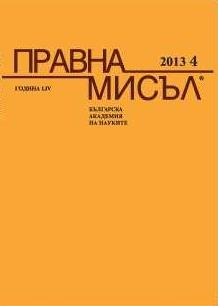Фактори, принципи, източници и способи за определяне на компетенцията на държавните органи
Factors, principles, sources and methods of determination of competence of state bodies
Author(s): Petar IlievSubject(s): Law, Constitution, Jurisprudence
Published by: Институт за държавата и правото - Българска академия на науките
Summary/Abstract: Determination of competence is influenced by different factors: social roles of state bodies; general principles of the relations between state bodies; forms of organization and activity; types of issues to be solved; spheres of activity; objects of impact; functions; changes in co-relations between public and private matters; transformations between state and social institutions; changes in international relations; new tendencies in development of economic and social sphere; configuration of relations between political state and civil society; knowledge, professional experience, skills, education and qualification of state officials. Competence of each state body is a system of powers (rights and duties), having explicit public law essence. The following phenomena are not part of the contents and composition of competence: legal rules; activity and functions; object of impact (social relations). These phenomena have relations to competence but they are not included in its contents. The subjects of competence are: the state; state institutions and state bodies; bodies of local self-government; structures providing public services. The principles of competence are: formation of each competence as an integral part of the whole public power; relative independence of each competence; coordination between different competences; specification of mutual influence between competences; universality; legal basis; separation of competences related to the fundamental principle of separation of powers; rational relations between democratism and efficiency; programing and orientation to results. In legal theory it is considered that competence derives from and is determined on the basis of: a) explicit legal rules; b) functions and tasks assigned by some legal act; c) delegation by a superior state body; d) substitution; e) by legal determination of the superior state body that has the powers to define the lower competent state bodies. The methods of determination of competence are the following: a) method of explicit list; b) combined method; c) method of "implied" or "presumable" powers; d) indirect method; e) method of partial determination; f) method of different structural composition; g) imperative method.
Journal: Правна мисъл
- Issue Year: LIV/2013
- Issue No: 4
- Page Range: 3-23
- Page Count: 21
- Language: Bulgarian
- Content File-PDF

